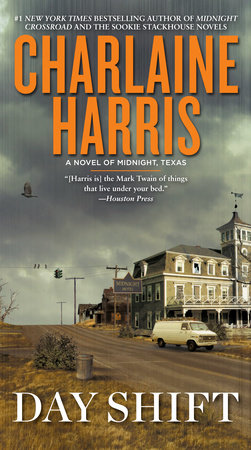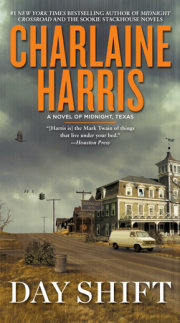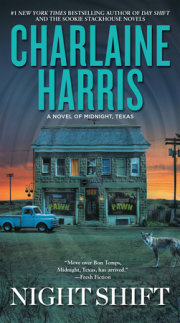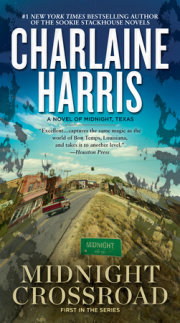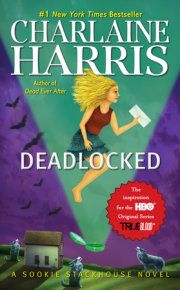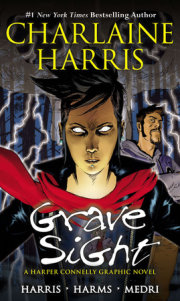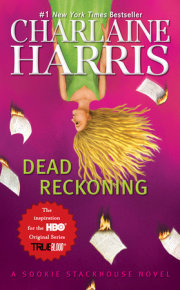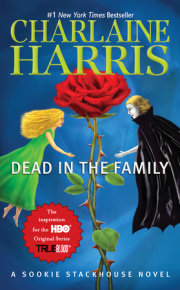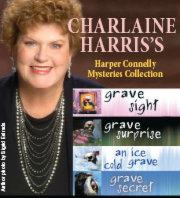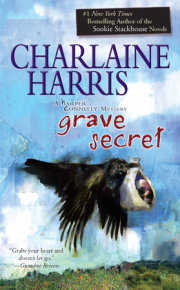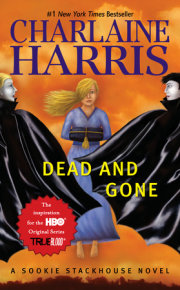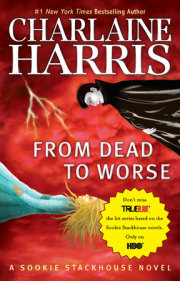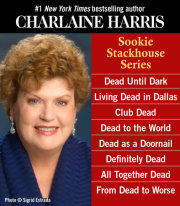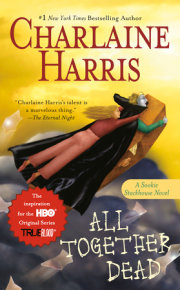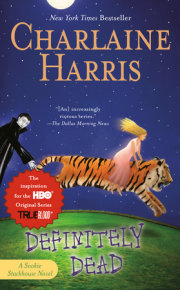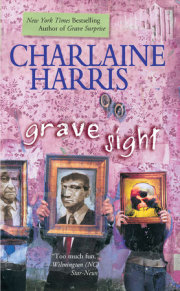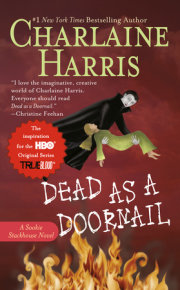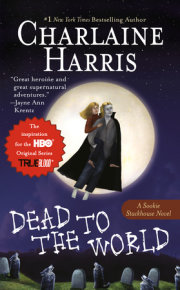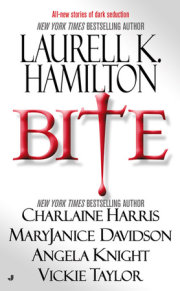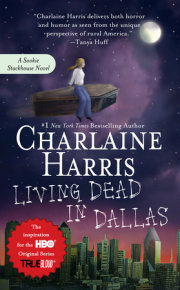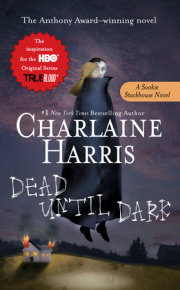ACKNOWLEDGMENTS
It isn’t the rumbling of the trucks that seizes Manfred Bernardo’s attention; it is the silence that falls when their ignitions die. Big trucks often go through Midnight, slowing to stop for (or speeding up to beat) the traffic light at the intersection of the Davy highway and Witch Light Road. Since Manfred’s rented house lies on Witch Light Road, he’s grown used to the sound until it is simply background music. But the absence of that sound pierces his preoccupation. He’s on his feet and opening the front door before he’s aware of pushing back from his desk. He grabs a jacket from the rack by the door.
Glancing across the road, he sees his friend Fiji Cavanaugh come out into her front garden, which is at its bleakest in January. It’s cold today, by Texas standards, but sunny. Her cat, Mr. Snuggly, a golden tabby, is at his current favorite sunning spot, the base of the pot where Fiji plans to try a gardenia. Even Mr. Snuggly is staring west.
Manfred exchanges a nod with Fiji, who is bundled in a quilted coat. He notes that today she has inexplicably arranged her hair in two dog-ears, like a six-year-old. Then he turns his attention back to the trucks. One is an equipment truck, and it’s laden with building supplies: boards, bricks, electrician’s wire, plumbing pipes, hardware. Two battered white vans have disgorged a clown-car number of small brown men, wearing hoodies they will surely discard as the day warms. Emerging from a Lexus, clearly in charge, is a tall white woman in tan slacks and a blue silk T-shirt. She’s wearing a faux-fur vest. Her thick brown hair is gathered back into a sleek ponytail, and she wears silver earrings and a silver necklace. She also wears glasses, with big square tortoiseshell frames, and her lipstick is an aggressive red.
All these various vehicles, with their assortment of passengers, have converged around the defunct Río Roca Fría Hotel at the southwest corner of the intersection. As far as Manfred knows, it has been closed for decades. The work crews immediately start pulling the boards off the doors and windows and tossing the ancient plywood into a large skip that yet another truck has deposited on the cracked sidewalk. The workmen swarm into the dark interior of the hotel.
It reminds Manfred of a giant boot kicking a dormant anthill.
Within five minutes, Fiji has crossed the road to join him. Simultaneously, Bobo Winthrop saunters down the steps of his business and residence, Midnight Pawn, which is situated at the same intersection as the Río Roca Fría Hotel but catty-cornered to it. Manfred sees (with resignation) that Bobo is looking quietly handsome today, though he’s wearing faded jeans and an ancient T-shirt with an equally ancient flannel shirt open over it. Manfred and Fiji stand with Bobo, and as they do, Manfred sees that west of the intersection, Teacher Reed has come out of Gas N Go; it’s directly across the highway from the pawnshop on the east and the hotel on the south. His statuesque wife, Madonna, is standing on the sidewalk in front of the Home Cookin Restaurant with Grady, the baby, who’s wrapped in a blanket. She’s holding Grady with one arm, shading her eyes with the other. Across the street from Madonna, Joe Strong and Chuy Villegas have stepped out of the Antique Gallery and Nail Salon. Joe is like his name: muscular. He looks as though he may be forty. Chuy is shorter, his dark hair is thinning a bit, and his skin is the color of toast.
Even the Rev, in his rusty black suit, emerges from his white-painted chapel to cast an unreadable look at all the activity.
We’re only missing Olivia and Lemuel, Manfred thinks. Of course, Lemuel cannot come out during the day, and Olivia is gone on one of her mysterious business trips.
After a few more minutes of watching and wondering, Joe Strong takes the initiative and strolls across Witch Light Road. He threads his way through the busy men to Boss Woman, who appears to be looking over some plans on a clipboard—though Manfred is sure, reading the clues in her stance, that she is well aware of Joe’s approach.
Boss Woman turns to face Joe and extends her free hand to shake his, a professional smile pasted on her face. She is able to look Joe directly in the eyes, Manfred observes. She seems to like what she sees. The well-groomed Joe is pleasant looking and has a warm manner. His mouth moves; her mouth moves. They grin at each other without sincerity. Manfred thinks, It’s like watching a ritual. In his peripheral vision, he spies the Rev retreating into his chapel, but the rest of the Midnighters stay outside.
Bobo turns to Manfred. “Had you heard anything about this?” he asks.
“No. Believe me, I would have spread the word,” Manfred tells his landlord. “This is a big thing, right?” He is aware that he feels ridiculously excited by this development in the small town where he’s lived for less than a year. Rein it in, he advises himself. It’s not like the circus has come to town.
And yet, in a way, it’s exactly like that. Fiji’s round, pretty face reflects his curiosity. Her eyes are lit up.
“What do you think?” she says, bouncing up and down on the balls of her feet. “They’re going to reopen the hotel, huh? How can they even get it back up to code? It’s been closed so many years. Everything will need to be ripped out and replaced. Plumbing, electricity . . . floors . . .”
Bobo nods. “I’ve been in there. Right after I moved here, Lem and I went in one night. There was a loose board at the back, and Lem pried it open. We had flashlights. He just wanted to show it to me.”
“What was it like?” Manfred asks.
“Spooky as hell. The old reception desk with all the pigeonholes for mail is still there. The light fixtures were just hanging down with all these cobwebs on ’em. Like a horror movie. High ceilings. Wallpaper coming off in shreds. Smelled like mice. We didn’t even go to the second floor. The stairs were a death trap.” He smiles. “Lem remembered it when it was open. He said it was pretty nice then.”
Lemuel is well over a century and a half old, so it is not surprising that he can remember the hotel in its heyday.
“So why would anyone spend the money to renovate it?” Manfred says out loud, since that is the question on all their minds. “Wouldn’t it be cheaper to build a Motel 6 if you felt like Midnight could support a hotel?”
“Who wants to spend the night here?” Fiji asks, another question they’ve all thought about. “There are three motels in Davy if you go north, and at least six over in Marthasville if you go west. If you go to the interstate, there are a skadillion places to stay. Besides, Home Cookin isn’t open for breakfast.” It’s the only restaurant within fifteen miles.
They contemplate all those facts in silence.
“How many rooms in that hotel?” Manfred asks Bobo.
Bobo looks down at him, blue eyes narrowed in thought. “I wouldn’t think more than twelve,” he concludes. “The ground floor is the lobby and the kitchen and the dining room, plus there was an ancient phone booth, don’t know when that went in . . . and there weren’t bathrooms in the rooms . . . so, say four guest rooms on the ground floor plus a bathroom and the public rooms, and then eight on the second floor plus two bathrooms? And the third floor was storage and staff rooms, Lem said.”
Fiji grabs Bobo’s arm. “You said dining room?”
“Yeah,” Bobo says, surprised by her agitation. “Oh. I get it. The Reeds.”
“I don’t know how Home Cookin keeps open, anyway. Really. Think about it. How?” Manfred spreads his open hands as he asks them.
But Bobo and Fiji ignore Manfred’s question. They are just glad to have a good cook like Madonna in Midnight.
“If they don’t open the dining room . . .” Bobo says.
“It’ll be a good thing.” Fiji ends his thought. “Home Cookin will be busy, Gas N Go will be busy, and maybe even Joe and Chuy will sell more antiques and do more nails.”
“Huh,” Manfred says. “That would be all right.” Though he really feels he doesn’t want anything to change in Midnight, he makes himself admit that a touch of prosperity would be good for the town. His own business is done by telephone and Internet and does not depend on foot traffic.
Manfred’s cell phone rings, and he whips it out of his pocket. He doesn’t have to look at the caller ID to know it’s Joe, whom he’s watched walking back to Chuy.
“We need to have a meeting tonight,” Joe says without preamble. “Maybe Fiji can go ask the Rev, and Bobo can tell Lemuel. Is Olivia in town?”
“I don’t think so. What time?”
“Here at the shop, whenever it’s really dark.” There’s a muffled sound while Joe asks Chuy a question. “Seven o’clock good?”
“Fine, I’ll tell them.”
“See you then.”
Manfred ends the conversation and passes along the message.
“I’ll tell the Rev, but you can’t ever predict what he’ll do,” Fiji says with a shrug.
“I’ll put a note downstairs for Lemuel,” Bobo says. “He’ll see it the minute he gets up. Maybe Olivia will be back by then.”
That night, when the work crews have gone and the tall woman, too, the inhabitants of Midnight assemble in the Antique Gallery and Nail Salon. Occasionally, they can hear Rasta yapping upstairs in the very nice apartment Joe and Chuy share. “I thought he might wake up Grady,” Chuy explains. “He’ll calm down in a second.”
Sure enough, Rasta falls silent after everyone has filtered in. The salon area is the front right corner of the store, and the antiques, dusted and arranged attractively, take up the rest. Joe has assembled some folding chairs and an old love seat around a refreshments table. He and Chuy have made lemonade and tea, and there are a couple of bottles of wine. They’ve put out a cheese and cracker tray. Fiji has brought a bowl of toasted, salted pecans. Manfred tries one to be polite, then finds it hard to resist grabbing a handful.
When they all have drinks and food, they choose seats.
Madonna and Teacher settle on the love seat, with baby Grady drowsing on Madonna’s chest. Madonna is regal and a little scary, and she’s never been especially friendly. Her husband, Teacher, who is running Gas N Go until another buyer is in place, is the town handyman. Teacher is good at everything. Since he’s been working at the convenience store full-time, projects are going undone in the town, and everyone is ready for a return to the status quo, including Teacher. Grady has started pulling up and will begin walking, and Madonna’s already worried about cooking at the restaurant with him staggering around.
Joe stands in front of the motley assortment of chairs on which they’ve perched and begins, “Here’s what I know.”
They all fall silent and look attentive.
“The woman in charge is Eva Culhane. She’s not the owner. She’s his or her agent. I don’t know who the real owner is, she was real closemouthed about that. Here’s what she told me. The hotel is going to reopen as a hotel. But the eight small rooms on the bottom floor will be made into four suites with their own bathrooms, and four rooms on the upper floor will get the same treatment. These will be residence rooms.”
There is an intake of breath because so many people have questions.
“Wait,” Joe says. “Wait!”
There’s a little laughter, but they are all too curious or anxious to be very amused.
“The residence rooms will be for people who are in the area for a long-term job, like working for three months at Magic Portal. Or people who are waiting to get into an eldercare situation. As an aside, Eva Culhane told me that there’s a waiting list for all the eldercare places in a sixty-mile radius. The remaining rooms will be conventional hotel rooms. In the family quarters, there’ll be two people living there as staff. A cook will provide breakfast for residents and whoever stays at the hotel. Lunch and dinner will be cooked for permanent residents only, is what I got out of it.”
Madonna’s shoulders relax visibly. She gets a few diners from Magic Portal, which is an Internet company, every month. (Thanks to Magic Portal, Midnight has great Internet.) And ranchers come into Midnight every now and then for a meal. But she’s in the room with her regulars, right now. More customers would be welcome. Elderly people like traditional food, which is what Madonna cooks.
“What kind of staff?” Fiji asks.
“There’ll be two people in residence,” Joe repeats.
“Will one of them be a nurse or some kind of medical person?” Bobo asks. “Sounds like they might need that. And they’ll have to hire a maid, I would think. That’s a lot of rooms to clean for one person, plus dishes, plus food prep.”
“Good questions. We’ll have to find out.” Joe looks a little chagrined he didn’t think of all this.
“Did Ms. Culhane give you a timetable?” Fiji asks.
“She said they hope to be open within six months.”
There’s a moment of silence.
“They must have a shitload of money,” Teacher Reed says, and Bobo nods. “That’s a quick turnaround.”
Olivia, who’d driven in an hour earlier, speaks for the first time. She is sitting with Lemuel the vampire, her lover, and she looks exhausted. They are all ignoring the fact that Olivia’s shoulder is obviously bandaged under her shirt. “We have to find out who owns the company doing the restoration,” she says.
“Manfred, can you dig that up?” Joe asks.
Manfred is the most computer savvy of all the Midnight residents, but he’s no hacker. He just knows his way around the Internet. “I can try,” he says. Joe hands him a brochure, one that Eva Culhane had given him. It has a corporation name on it, MultiTier Living. Olivia extends her hand silently, and Manfred hands it to her. She looks at the brochure intently before she hands it back.
When everyone has said everything they have to say (some more than once), Lemuel supports Olivia with his arm as they leave Joe and Chuy’s store/salon. The remaining Midnight residents go their separate ways: Teacher, Madonna, and the sleeping Grady cross the street to walk past Home Cookin Restaurant and behind it to their double-wide, the Rev splitting off from them to go right to his bleak little cottage. He has not spoken during the whole meeting, but he has eaten cheese and crackers and the toasted pecans.
The people who live east of the Davy highway (Bobo, Manfred, Fiji) walk together, Fiji carrying a plastic container with the remaining pecans. Fiji hands the container to Bobo. “You and Manfred split those,” she says. “I’ve got some more at home.” She looks both ways before she crosses Witch Light Road. The golden tabby cat, Mr. Snuggly, is waiting for her, and Bobo and Manfred watch the woman and the cat go in the front door. Bobo says, “Hold out your hands.” Manfred pulls a real cloth handkerchief from his pocket and holds it ready to catch half the salted pecans. Gathering up the corners, he nods his thanks, and Bobo splits away to go into the side door of the pawnshop, which leads to the stairs going up to his apartment.
Manfred unlocks the front door of his little house, which he rents from Bobo. He passes by his huge curving desk, crowded with computer equipment, to go through the little den (designed as a dining room) and back into the kitchen. He’s full and not really thirsty, but he decides to have a cup of hot chocolate before he goes to bed, and he pulls out the extra blanket. He feels unaccountably chilled by the advent of the new people, and he wants to be warm tonight.
The next morning, Manfred sits at his computer and types “MultiTier Living” into his search engine. He reads the resultant description, which is too broad to be satisfying. MultiTier offers housing of all sorts, including “residence inns,” and long- and short-term care facilities for the elderly and recuperating . . . at least those who don’t require skilled nursing care. Manfred wades through all the bland verbiage and pictures of healthy-looking people of a certain age who are smiling at their attentive caregivers or relaxing in their small apartments. Finally, he finds another name, Chisholm Multinational.
When he searches for it, the website he finds is impressive and almost frightening in its scope. Chisholm Multinational has so many divisions he could wander through its website for hours. It’s like an octopus. One tentacle is all about hotels and medical facilities: regular hotels on the high end, rehabilitation centers, nursing facilities for the care of Alzheimer’s patients or people suffering from mental health issues or people going through the ravages of cancer.
Another tentacle contains various construction companies. Manfred can see that connection; you might as well build all these various structures, right? Yet another tentacle deals with janitorial work. Again, logical. You have to clean all those buildings you’ve erected to hold travelers and sick people.
He pushes away from his desk and decides he needs a cup of tea. He has to admire the person at the head of Chisholm Multinational, who he gathers is the grandson of the founder. He wonders if this man has any idea what all the branches of his company are doing . . . or where Midnight, Texas, is. He imagines some group of suits gathered around a large map, peering at the tiny pinpoint that is Manfred, the Rev, Fiji, Bobo, Chuy, Joe, the Reed family . . . the population of this almost-ghost town.
He feels a frisson of distaste, almost fear.
1
Five months later, Manfred Bernardo checked into Vespers, an upscale hotel on the very edge of Bonnet Park, one of the oldest and “nicest” neighborhoods in Dallas. Actually, Bonnet Park was its own little city. Manfred had thought that his clients might arrive so wired from dealing with the traffic of downtown Dallas that they might not be able to transition to a mellow séance or reading, so he’d selected Vespers first for its location, and second for its decor. The interior of Vespers combined a lot of modern lines and shades of gray with random swaths of brilliant fabric and nearly life-size sculptures of deer and lions. The deer looked startled and the lions were snarling, both reactions appropriate to finding themselves in such surroundings. Vespers played subdued techno music in the background nonstop, and all the desk staff looked as though they’d been kidnapped from a Nautica photo shoot: young, attractive, healthy, outdoorsy. They were all people who would not mind viewing their endless reflections in the other design element of Vespers—mirrors.
Manfred himself was more of an indoor kind of guy, though that was at least partly due to his occupation. Phone psychics who also had websites had to stay by the phones and the computers, so he was pale. He was also definitely not tall or pumped up. And his multiple piercings and many tattoos did not make him look hearty. But he did attract a certain kind of woman, and he did have his own brand of charm, or at least so he’d been told.
The desk clerk who checked him in and ran his credit card was not one of the women who appreciated that charm.
“And will you be wanting to make a reservation for Vespers Veneto tonight?” she asked, smiling brightly.
Though he was tempted to opt for room service, Manfred told himself that while he was in the city, he should look at as many people as he could, since there were so few in Midnight. He felt a bit starved for strangers. “Yes,” he said. “That would be perfect. A reservation for one, for eight o’clock.” He used the word “perfect” preemptively, hoping she would not repeat it.
“Perfect,” she murmured automatically, as she entered the reservation on her keyboard. Manfred wished there were someone he could look at, to roll his eyes. Instead, he looked in the huge mirror behind the clerk, and to his utter astonishment, he did see someone he knew. His mouth opened to call, “Olivia!” But at that second Olivia Charity’s brown eyes met his in the mirror, and she gave a tiny shake of her head.
“Did you need anything else, Mr. Bernardo?” the young clerk asked, looking at him with a bit of concern.
“No, no,” he said hastily, scooping up the cardboard folder containing his plastic keycard. “Thanks,” he added.
“Elevators over there,” she prompted, pointing to his right. “Behind the panel of mirrors.”
Of course, he grumbled to himself, while he went around the large wall to find the elevator bank. When one finally whooshed open, he could see his exasperated reflection in the mirror at the back of the elevator car. He rode up in silence. Out of habit, he looked up and down the hall when he stepped out, but he didn’t see any security cameras. That didn’t mean they weren’t there, but he found it a little surprising in a place like Vespers, whose hauteur and prices would surely attract at least some well-heeled and famous guests.
Despite the cost, Manfred had opted for a suite so he could conduct private readings in his room. If he’d been traveling for any other reason, he would have picked a cheap motel. All he needed was a bed and a functional bathroom, preferably clean. But clients always thought better of him, and therefore themselves, if they consulted him in an obviously expensive venue.
To Manfred’s approval, the living room was lavish: couch, easy chair, television, bar, and microwave, with a small round dining table and two chairs that would be perfect for his readings. The bedroom was as comfortable as he’d hoped, and the bathroom was positively over-the-top. Manfred unpacked quickly and efficiently (he’d brought an all-black wardrobe for this weekend) and put his list of bookings on the round table, together with his tarot cards, his mirror, and a velvet pad on which to place objects brought to him by clients to aid him in his readings. He was not primarily a touch psychometrist, but every now and then he got a flash of clarity.
He felt keen anticipation as he viewed the layout of familiar items. In-person readings were exciting, because he had a chance to use his true gift to the best of his ability. For that reason, the sessions were not only tiring, but occasionally frightening. He’d scheduled two in the morning, three in the afternoon for Saturday, and the same for Sunday. He’d check out Monday morning and drive back to Midnight.
But this evening, he’d relax and enjoy the change of scene and the rare luxury. This was a far cry from his little house in Midnight. In the bathroom was a claw-footed tub with a showerhead added much later, and not enough room to swing a cat. He could swing a good-sized lynx in this tiled wonder, with its multiple showerheads and double sinks. “Time to shower, change, and have a great dinner,” he said happily. He’d put the glimpse of Olivia Charity out of his mind.
Manfred felt far more urbane when he went downstairs. Though he knew it was probably not the fancy-restaurant thing to do, he took his e-reader with him. He wasn’t fond of staring off into space, and he was in the middle of a book about the Fox sisters, who’d founded Spiritualism. He’d also brought his cell phone.
A table-for-one diner is often in a less-than-stellar position, but Veneto wasn’t busy that night. Manfred had a whole horseshoe-shaped booth to himself, his back to an identical booth facing the opposite direction. Thanks to the ubiquitous mirrors, he found he had a good view of the room and almost everyone in it. After he’d ordered, Manfred decided he could see almost too much. In his black suit, he looked like a crow in a daisy field; the other diners were in light summer colors, as befitted June.
Then in a mirror high on the wall opposite him, he spotted one other person in black, a woman. She was seated directly behind him in the booth with another woman and a man. Though Manfred got out his e-reader and turned it on, he glanced up several times because her head and shoulders seemed familiar. After the third or fourth time Manfred checked out the woman, he realized he was looking at Olivia Charity again. He’d never seen Olivia so groomed before, and he was astonished at how sophisticated and gorgeous she looked.
In Midnight, Olivia wore jeans and T-shirts and boots, very little makeup or jewelry. The Dallas version of Olivia was wearing a lot of eye makeup. Her hair was put up perfectly in a roll at the nape of her neck. Her black dress was sleeveless and sleek. She was wearing a necklace formed to look like overlapping leaves. Manfred decided it was made of jade, though he was not knowledgeable about gems.
From his position, Manfred could only glimpse Olivia’s face from time to time. But her companions seemed engrossed in her conversation, so he felt free to watch them. They were both in their late fifties or even early sixties, he decided, but were definitely what you would call “well preserved.” The woman was blond by courtesy, but not glaringly so. She looked like a tennis player. Her jewelry glittered.
The man had a lot of gray hair, well styled and cut, and he was wearing a suit that Manfred suspected was very expensive.
They’re not talking about playing tennis, Manfred told himself. To a casual observer, the man and woman might appear to be having a pleasant conversation with Olivia, but Manfred was a keen observer by nature and trade. The couple both had the slight knowingness to their smiles, the wink-wink nudge-nudge consciousness that told him they were talking about sexual things in a public place.
Manfred was through with his meal by the time the three finished their conversation. The couple left together. In the mirror Manfred saw the woman fish something from her tiny purse and slide it over to Olivia’s hand. A keycard. Huh, I didn’t expect that, he thought. He’d always speculated about his mysterious neighbor, who had an apartment in the basement of the pawnshop next door to Manfred in Midnight.
Manfred had met Olivia during the previous year at the same time he’d met Bobo’s other tenant, Lemuel Bridger. No one had ever given him much background on his neighbors, because people in Midnight weren’t prone to gossiping about each other, as a rule. But gradually, Manfred had come to understand that Olivia had a mysterious job that took her out of town from time to time. And he’d observed that Olivia sometimes returned to Midnight the worse for wear. Amid other possibilities, he had considered the idea that Olivia might be a prostitute. But as he’d gotten to know her, something about the way she handled herself made him discard the idea.
Despite the way her dinner with the older couple had played out, he couldn’t believe it now. What’s she up to? he asked himself. He glanced down at his watch. After seven minutes, Olivia rose and left the restaurant. She walked right by him, but she didn’t acknowledge him by so much as a twitch of an eyebrow.
Manfred left the restaurant maybe three minutes later, but he did not see Olivia at the elevator bank as he’d half expected. In fact, he didn’t see her again that night. He woke once in the early morning, aware of some hubbub down the hall from his third-floor room; but it subsided, and he slept another hour.
When he stepped out of his room to go down to the hotel’s coffee shop for breakfast, the police were wheeling a body in a bag out of a room closer to the elevators than his. Manfred thought, Oh, shit. What did Olivia do?
He stayed in his doorway until the gurneys had rolled into the staff elevator. When he ventured out and down the hall to the guest elevators, a policeman holding a clipboard asked him his name. When Manfred responded, the cop checked it off on a list. “One of the officers will talk to you later,” the cop said. “You’ll need to stay in the hotel until you’ve been interviewed.”
“I’ll be here.” Manfred tried hard to sound appropriately somber and innocent. “I am assuming one of the guests died?”
“Two. But the officer will tell you what you need to know.”
Manfred stepped into the elevator, his thoughts racing around like a mouse in a maze. He realized he’d never considered that Olivia might not be involved at all, and he’d also never considered that the body bag might contain anyone besides the man or the woman she’d dined with the night before.
When he emerged from the elevator, the calm, techno lobby of Vespers had been overturned. Now the mirrors reflected quite a few people, mostly of the police persuasion. Manfred sighed heavily. He doubted the lobby of Vespers had ever seen so many police, uniformed or plainclothes. The staff did not look so smoothly chic today. They looked both anxious and excited.
Inside the sunny morning restaurant (Mattina), seated at a table for two, was Olivia. She looked much more like the woman he knew, in lighter makeup and a gauze blouse and khakis. He looked away elaborately (This is not the woman I seek), but as the hostess bustled up to seat him, Olivia jerked her head in a summons.
“I see a friend,” he told the hostess, and slid into the chair opposite Olivia’s. Her plate of fruit and bowl of yogurt had been sampled. As he sat, she signaled for her coffee cup to be refilled.
“My gosh, Manfred!” Olivia said, leaning forward to give him a clap on the arm. “I didn’t know you were in Dallas!”
“Same here,” he said at the same volume level, just loud enough to be heard by the waitstaff. “I thought I saw you last night, but then I said to myself, ‘No, that just can’t be Olivia!’” His voice was light, but he knew his expression was anything but. Olivia smiled at him.
The waiter arrived with the coffeepot to refresh Olivia’s cup. Manfred took the opportunity to order a large breakfast. He would need the fuel.
Her face growing somber, Olivia said, “In a totally weird coincidence, I saw the Devlins last night. I haven’t seen them in five years, I guess. They seemed just fine, so normal. I just can’t understand it.”
So the dead couple had been the Devlins.
“I never met them,” Manfred said firmly and a bit more loudly than necessary. “But I saw a body being removed down the hall from me, and the policeman wouldn’t tell me what had happened. Though it seems you know?”
“Yes, a horrible thing. Stuart . . . well, I hate to even say it, but apparently last night Stuart and Lucy had some kind of argument in their room, and he killed her. And then himself.”
He stared at her. There was nothing in her face or eyes, no subtext. “Oh, Jesus,” he said, stunned and sickened. He scrambled to recover his composure. “Did anyone hear them fighting? That’s really . . . awful.”
“It is,” she agreed, after a gulp of coffee. “I ran into them in Veneto last night, and we ended up having dinner together. They were kind of sniping at each other, but that’s the way some couples do, you know? They’d been married so long. It just seems incredible.”
“It seems incredible to me, too,” he said, aware that his voice was way too grim. He made another effort to relax. “So assuming the police let you go, what are your plans for the day?”
Olivia gave him a gentle smile. “I had always planned to spend another night here, and I’ll stick to that. I hate to sound shallow, but I guess I’ll just go on with my little shopping trip. That was my agenda for today. Now I kind of want to take my mind off them. I can’t help them or change the situation, after all.” She looked down at her cup and shrugged. “You know when you come to Big D, you’ve got to shop at the Galleria. A gal’s gotta have clothes. I’ll take in a movie, maybe go to a comedy club tonight. I could use a good laugh, especially after all this. You want to tag along?”
“Sorry,” he said. “I’m here to work, and I’m booked up today and tomorrow.” He was free both evenings, but he knew he’d need the time to recuperate. Besides, just now he didn’t want to go anywhere with Olivia.
“Work?” There was a faint question in her voice.
“Private readings.”
She looked at him seriously, as if she were really seeing him for the first time. “I hope you make a bundle,” she said.
“That’s the plan,” he said, and the waiter set his plate in front of him. He was glad of the interruption. Olivia smiled at his heaped plate, but he didn’t react. He poured syrup on his stuffed French toast and cut it up, hoping his appetite would return. He ate a lot on days he was working one-on-one, because the last thing he wanted was to get woozy. He dug into his food, gradually feeling hungrier since everything was delicious. Olivia drank more coffee, but he was glad she let the conversation drop so he could eat in peace. She charged her meal to her room and gathered up her cell phone and newspaper.
“Were you going to mention this to Lemuel?” Manfred asked.
She paused in pushing back her chair. “Why not?”
“Just wanted to be sure we were on the same page.” If there was one person in the world Manfred did not want to keep a secret from, that person was Lemuel.
A stocky man in a sports shirt pulled up another chair to the table. Startled, Manfred looked from the man’s dark face to Olivia. She looked mildly questioning and not at all alarmed.
“Manfred, this is Detective Sterling, Bonnet Park police.”
“Manfred Bernardo.” He shook the detective’s hand. “Did you want to talk to me, or shall I scoot along?” He glanced at his watch. He had thirty minutes until he had to meet his first client.
“Just a few moments of your time,” the detective said. He had a soft, conciliatory voice, contrasting sharply with a stern face. Olivia nodded and left, without a backward glance.
Great, Manfred thought. He did his best to look open and innocent. “I have an appointment soon,” he said, trying to sound neutral, when Detective Sterling didn’t speak immediately. “This is a working weekend, for me.”
“You know Miss Charity.”
“Sure. We live in the same town.”
“You met here by prearrangement?”
“No.” Manfred smiled. “We see plenty of each other in Midnight.”
“You ate in the restaurant here in the hotel last night?”
“I did. Had an eight o’clock reservation.”
“And you saw Miss Charity then?”
“I saw the back of her head, turns out. I was facing away from her, but there are mirrors all over this place. I even thought, ‘She looks familiar,’ but she didn’t turn around, and I was reading. I didn’t realize who it was until I saw her this morning.”
“What was she doing?” The detective looked down at a notepad covered with scribbles, but Manfred was sure he didn’t need to check someone else’s account—the waiter’s? Another diner’s?
“Last night? Talking to an older couple. I’d never met them.”
“How did they seem to be getting along, to you?”
Manfred let his surprise show. “Since I didn’t think I knew any of the people, I didn’t pay a lot of attention,” he said. “If something out of the ordinary had happened, I’m sure I’d would remember it. Raised voices or throwing a drink . . . major drama.”
“So that’s all you noticed. Three people, sitting in a booth, talking. You were pretty close to them, back-to-back. You didn’t hear any of the conversation? You didn’t form a conclusion about how they were all getting along?”
“No. None of my business.”
“Famous psychic like you, no . . . emanations?” Detective Sterling wiggled his fingers in the air to indicate something spooky. It would have entertained a five-year-old. Manfred was not amused. He’d been sure that the detective knew who and what he was the moment he’d come up to the table. He was less sure the detective had any idea at all about Olivia’s means of making a living. It would have been informative and entertaining to ask Sterling, but he knew he couldn’t.
Manfred smiled tolerantly (he’d had a lot of practice at that). “Not a single vibration,” he said. He glanced at his watch again. “I’m sorry, I need to leave now.”
“Sure, go right ahead, Mr. Bernardo. You’re staying here tonight?”
“Tonight and tomorrow night, unless something happens to change my plans.”
“What could happen?” Sterling seemed genuinely curious.
“My clients may not want to come to a hotel where there’s an active police investigation.”
“So far, everything seems to point to a murder/suicide,” the detective said. “That’s what the electronic keycard activity indicates. Just one entry, when they came back to their room after dinner. Though we’re still checking every little fact.”
“Of course. You have to be sure,” Manfred echoed. Only keyed entrances would show up on the hotel’s computer, he was fairly sure. The computer wouldn’t register the room door being opened from the inside. Olivia hadn’t used the keycard Lucy Devlin had given her.
“After all, we’re not psychic like you,” Detective Sterling was saying, still with that fake-jovial edge to his voice.
“Wouldn’t it be handy if you were? Well, best of luck with your investigation.” Manfred rose.
“So if I need to talk to you . . .”
“Give me a call.” Manfred told Sterling his cell phone number, and Sterling wrote it on the pad. “I’m working, but I can spare a few minutes for the police.” On that note, Manfred left the restaurant, feeling better with every step away from the detective.
He was glad to have some time to collect himself before his first client arrived. Not only did he need to push away the gnawing worry about Olivia and what she might or might not have done, but he had to prepare himself for the day to come. He looked forward to exercising his true gift with both excitement and apprehension, and the last thing he needed was to brood about the dead couple. He was worried they would contact him, and he was very grateful he hadn’t met them or touched them. That would have made it easier for Stuart and Lucy Devlin to track him down from the blue hereafter.
Manfred’s first and second appointments of the day went well. He was able to tell Jane Lee that her grandmother approved of Jane’s fiancé, and he was able to suggest a place for Robert Hernandez to look for his mother’s gold necklace. He lay down during his lunch hour with his eyes closed, and his energy level went back up.
Manfred greeted his one o’clock appointment with some pleasure. He had had sessions with Rachel Goldthorpe before. She was a longtime client who actually lived in Bonnet Park; he’d visited her home. Rachel was in her midsixties, with two daughters and a son, and several grandchildren; she loved the grandchildren and her daughters, who made her happy. Rachel had been widowed less than twelve months before. She came to Manfred because she missed her husband terribly, not least because Morton had been the only one who could handle their son, Lewis.
Manfred had actually met the Goldthorpe children, but briefly. His opinions about them had been largely formed from Rachel’s anecdotes. Annelle and Roseanna, the daughters (who were now in their later thirties), seemed both loving and dutiful. But Rachel’s youngest child, Lewis, was apparently batshit crazy. According to his mom, Lewis had been in and out of trouble and in and out of mental health care since he’d been fourteen. Now he was thirty-two, never married, and obsessed with his mother’s possessions. After losing his last job with a property management company, he’d moved back into her pool guesthouse. From there, Lewis watched Rachel’s every move and complained endlessly if she gave money to charity or even took her old clothes to Goodwill.
Today, Rachel wanted to consult with her husband, Morton, about the problem of Lewis. Manfred was fond of Rachel at least in part because he’d had great success with contacting Morton Goldthorpe, who urgently wanted to communicate with his wife. Since Morton had passed away, Manfred’s sessions with Rachel had been rewarding and exciting.
When he’d sent out an e-mail blast to announce he was available for private sittings again, Rachel was among the first to make an appointment.
When Manfred answered his door, he was shocked to see how wretched his client looked. “What’s wrong?” he asked, before he could think how tactless that sounded.
“I know, I know, I look bad,” she said. “I’m getting over pneumonia.” Rachel trudged past him and spotted the table, steered toward it. Her breathing was audible. Rachel was heavy, but she’d always been bouncy and vigorous. Today her flesh seemed to sag on her bones. There were circles under her eyes. “And then downstairs, somehow I dropped my purse. Everything went everywhere. They had to help me gather things up.”
“Rachel, should you even be here?” he asked, breaking one of his own rules. He never commented on a client’s appearance, pro or con.
She made an effort to smile, patting his shoulder. “I’m a lot better. This is the first time I’ve been out in three weeks. This morning I got my hair done and came to see you. Boy, does it feel good to be out of the house!” She patted her salt-and-pepper hair, which was arranged in its usual stiff curls. Her T-shirt read “World’s Best Grandma.”
“Who gave you the shirt?” Manfred said, figuring it was the kind of thing she’d like him to notice. He tried not to look as concerned as he felt.
Rachel sank into the chair with obvious relief. She pulled a refillable black bottle decorated with butterflies out of her purse and put it on the table in a handy spot. “Annelle’s kids. And Roseanna’s twins gave me the water bottle last Mother’s Day,” she said, with pride. “So much better than using a new plastic bottle every time, right? Better for the environment.”
“You sure you feel up to this?” Manfred said. He didn’t want to persist, but he was more than a little worried.
“I’ve been looking forward to this for weeks,” she said firmly. “Let’s get to it. I need some good in my life. Otherwise, Lewis will be the death of me. Did I tell you he’d moved into the pool house?” She took a big drink and sighed, recapping the bottle and extending her plump hands. “Ready.”
Manfred sat opposite her and reached across the table to take her hands in his own. Other clients had different preferences. They wanted the tarot or the mirror, or they’d brought a loved one’s possession for Manfred to hold. Rachel always wanted the touch. He wrapped her chilly fingers in his warm ones and bowed his head, his eyes closed. “Morton Goldthorpe, husband of Rachel, I’m searching for you,” he said. “Rachel needs you.”
“Oh, boy,” she breathed. “Do I ever. That Lewis! He told me he was going to take charge of my jewelry. Take charge! Like I was an Alzheimer’s person! So I had to hide my diamonds and my rubies.”
Manfred heard her words from a distance. He was busy opening himself to receive Morton. But he felt relief that Rachel had hidden her jewelry. Though she dressed and looked exactly like thousands of grandmothers who passed through the doors of any given Walmart every day, Rachel was very wealthy. The late Morton had made a lot of money in real estate and had been smart enough to get out when the getting was good. Though Manfred had no idea what Rachel’s bank statement would read, he knew she was well able to afford his fees, and evidently a lot of sparklies, too.
But all those considerations faded away as Manfred connected with the plane that housed the dead. His eyes were closed, so that he could see that world better: He was faced with the usual wall of billowing mist, out of which faces manifested with frightening rapidity.
And there was a face he knew approaching rapidly through the mist. Rachel’s fingers felt oddly slack in his grip, but he kept his focus with ferocious intensity.
“Here he is,” Manfred murmured, feeling Morton speeding through him. The spirit manifested a little differently today. Usually, Morton stopped at Manfred’s fingertips, content to touch his wife through Manfred. But today Morton ripped through Manfred with such force that he passed right into his Rachel. “You will not suffer, my dearest Rachel,” Manfred said, to his own surprise.
“Oh!” Rachel said dazedly, and to Manfred’s ears she sounded both excited and a bit startled . . . but not frightened. Manfred’s eyes flew open to look right into Rachel’s, and in that flash of a moment her eyes went blank. She slumped forward onto the table.
And then her fingers relaxed completely.
Morton flowed back through Manfred. Taking Rachel with him. For five seconds Manfred couldn’t see anything at all, and he felt utterly empty.
It seemed like an eternity until his vision cleared. Immediately, he noticed the limpness in Rachel’s body. He knew that she was dead. He let go of her hands to wrap his arms across his chest. He shivered all over. He wanted to cry or scream or run shouting from the room, but he did none of those things.
Sometimes, as his grandmother had often said, shit just happens.
He rose to walk unsteadily to the nearest phone. He punched a number to reach the front desk. “Is there a doctor in the hotel?” he asked, hearing his voice crack. He hadn’t sounded as uncertain since he was thirteen. “My guest is unconscious. In fact, I think she’s dead.”
2
So what happened then?” Fiji asked him. It was three days later, and they were sitting in her little kitchen. Fiji had invited Manfred and Bobo over to share a roast for Tuesday supper. She didn’t often buy expensive cuts of meat, but sirloin top roasts had been on sale at Kroger in nearby Davy, where the Midnighters went to shop. She’d cooked it traditionally, with new potatoes and carrots around the meat, and she’d made lots of gravy, and biscuits, too. It was so good that Manfred and Bobo had both had second helpings of everything.
“Then all the police who had been downstairs investigating a murder/suicide came up to my room,” Manfred said grimly. “It took me about an hour to explain what Rachel and I had been doing. They assumed I was some kind of gigolo. I guess they were hoping that I’d had a connection with the couple who’d died the night before, though they’d already questioned me about that.”
“Man,” said Bobo. Tall, fit, blond, and with a gorgeous white-toothed smile, Bobo was much more like someone’s idea of an ideal lover. In point of fact, Bobo was not vain and did not seem to be aware of how attractive he was. “With the lady in her sixties? That must have been embarrassing.”
“I was too scared to be embarrassed. By that time, I figured if they only thought I’d been having an affair with Rachel, I’d be glad.”
“Did you call Olivia? You said you’d seen her in the hotel.” Fiji poured more iced tea into Bobo’s glass.
Manfred had not discussed Olivia’s connection to the murdered couple, much less his near certainty that she’d killed them both. He felt both angry with Olivia and a little frightened of her (when he thought about the Devlins), but he didn’t think laying that on his friends would be right. He chose his words carefully. “I figured I’d just drag her into trouble with me if I called her. I have to admit, I really wanted to see a friendly face, so I definitely thought about it.” For exactly a second. He didn’t believe Olivia’s face would have been too friendly if he’d involved her. And he’d had a bad moment, a second really, of thinking, The Devlins died and now Rachel died. Coincidence?
“And what did the cops say?” Bobo asked.
“It wasn’t as bad as I thought it would be.” Manfred shrugged. “Rachel didn’t have a mark on her, and the hotel staff knew what I was doing, having people into my room. I didn’t exactly tell them I was a psychic, but one of my appointments did.”
“What about your other appointments? What did you do about them?” Fiji asked. Her mind was a great one for tangents.
“They moved me to another room. I saw two of them the next day, but two others canceled,” Manfred said. He wasn’t surprised, and he understood their reluctance to come into a hotel under media scrutiny, especially since they were going there to do something that would embarrass them if it became widely known. Meeting with a psychic wasn’t as reputable as going to a charity dinner, say.
“Really?” Fiji was incredulous. “You were able to focus on business after that poor woman died?”
“I would have been out of there,” Bobo said. “I would have been on the road back to Midnight as soon as I could pack my bags.”
They looked at him expectantly.
“At first I was shook up,” he admitted. “But Rachel passed so quickly, almost peacefully. After I got over the shock of it, I thought, if she had to die so young, maybe going that way was what she might have wanted. I’d never been in such close touch with a passing, not even my grandmother’s. Annelle—the daughter—was at Vespers in forty-five minutes. I was so relieved. She told them how much Rachel had looked forward to the session and how happy talking to me had always made her mom. She also said that she’d begged her mother to stay home until her lungs were clear,” he added more practically.
“What exactly happened?” Bobo carried his plate to the sink and rinsed it. “To make her die, I mean?”
“They’re doing an autopsy. But Annelle told me Rachel had been taking medication for high blood pressure. There was more wrong with Rachel than I knew. If she’d died at home, I don’t think they would have questioned her death, because she’d been under a doctor’s care. I hope they got the bottle of water she drank from. Surely they did. She had a big old purse full of stuff. And it was all messed up, because she’d dropped it in the lobby, she said, and she just threw things back in there.” After a minute, he added, “She said people in the lobby helped her pick up all her stuff.” He tried hard not to look like he was wondering if Olivia had been there, in the lobby, being helpful.
“So what about the son, Lewis? The one you said was so crazy?” Fiji picked up Manfred’s plate and took it to the sink. Surreptitiously, she dropped a scrap of roast beef into Mr. Snuggly’s bowl. Though the cat hadn’t been evident until then, suddenly he was there, head down and chewing. She smiled.
. All rights reserved. No part of this excerpt may be reproduced or reprinted without permission in writing from the publisher.

